Planning worship?
Check out our sister site, ZeteoSearch.org,
for 20+ additional resources related to your search.
- |
User Links
Person Results
William Lloyd
1786 - 1852 Topics: Gospel Call and Response Composer (attributed to) of "MEIRIONYDD" in The New Century Hymnal William Lloyd, a Welsh musician and music teacher, born at Rhos-goch , Llaniestyn , Llŷn , in 1786; died, according to his tombstone in Llaniestyn churchyard, on 7 June 1852 , aged 66. He is most known for his tune MEIRIONYDD. It was published under the name "BERTH" in Caniadaeth Seion ( 1840 ) published by Richard Mills.
Dianne Shapiro, from Dictionary of Welsh Biography, accessed 11-8-2018 from http://wbo.llgc.org.uk
William Lloyd
Edward Husband
1843 - 1908 Person Name: Edward Husband, 1843-1908 Topics: Gospel Call and Response Composer of "ST. HILDA" in Pilgrim Hymnal Husband, Edward was educated at St. Aidan's College, Birkenhead. Taking Holy Orders in 1866, he was successively Curate of Atherstone and Folkestone; and in 1878 Vicar of St. Michael and All Angels, Folkestone. In 1874 Mr. Husband published The Mission Hymnal, in which appeared his hymns as follows:—
1. Alas! poor world, I loved thee long. Rest in Jesus.
2. And dost Thou ask me, dearest Lord. Christ's Invitation, " Follow Me."
3. I must have Jesus only. Jesus only desired
4. Sweet Blood, dear ransom of our souls. The Blood of Jesus.
These hymns are very simple, earnest, and impassioned: and bear a great resemblance to Facer's compositions.
--John Julian, Dictionary of Hymnology (1907)
Edward Husband
William Bright

1824 - 1901 Topics: Call and Response Author of "He Sat to Watch O'er Customs Paid" in Rejoice in the Lord Bright, William, D.D., born at Doncaster, Dec. 14, 1824, and educated at University College, Oxford, where he graduated B.A. (first class in Lit. Hum.) in 1846, M.A. in 1849. In 1847 he was Johnson's Theological Scholar: and in 1848 he also obtained the Ellerton Theological Essay prize. He was elected Fellow in 1847, and subsequently became Tutor of his College. Taking Holy Orders in 1848, he was for some time Tutor at Trinity College, Glenalmond; but in 1859 he returned to Oxford, and in 1868 became Regius Professor of Ecclesiastical History and Canon of Christ Church. His publications include:—
(1) Ancient Collects, selected from various Rituals, 1857, 2nd ed., 1862; (2) History of the Church from the Edict of Milan to the Council of Chalcedon, 1860; (3) Sermons of St. Leo the Great on the Incarnation, translated with notes, 1862; (4) Faith and Life, 1864-66; (5) Chapters of Early English Church History, 1877; (6) Private Prayers for a Week; (7) Family Prayers for a Week; (8) Notes on the Canons of the First tour Councils. He has also edited (9) Eusebius' Ecclesiastical History, 1872; (10) St. Athanasius's Oration against the Arians, &c, 1873; (11) Socrates' Ecclesiastical Hist.; (12) with the Rev. P. G. Medd, Latin Version of the Prayer Book, 1865-69. His poetical works are, (13) Athanasius and other Poems, by a Fellow of a College, 1858; and (14) Hymns & Other Poems, 1866; revised and enlarged, 1874. The last two works contain original hymns and translations. To the hymn-books he is known through his original compositions, seven of which are given in the revised edition of Hymns Ancient & Modern and some are found elsewhere. In addition to “And now the wants are told," and "At Thy feet, O Christ, we lay" (q.v.), there are:—
1. And now, 0 Father, mindful of the love. Holy Communion. Published in Hymns Ancient & Modern1875. Part of a composition in his Hymns, &c.
2. Behold us, Lord, before Thee met. Confirmation. Printed in the Monthly Packet, Nov. 1867, and, in a revised form, in the Appendix to Hymns Ancient & Modern, 1868.
3. How oft, O Lord, Thy face hath shone. St. Thomas. Published in Hymns Ancient & Modern, 1875.
4. Once, only once, and once for all. Holy Communion. Written in 1865, and published in his Hymns, &c, 1866, in 6 stanzas of 4 lines. It was given in the Appendix to Hymns Ancient & Modern, 1868; the new edition, 1875, and several other collections.
5. We know Thee, Who Thou art. Prayer after Pardon. Written in 1865, and published in his Hymns , &c, 1866, in 5 stanzas of 4 lines. It was included in the Appendix to Hymns Ancient & Modern, 1868, &c.
Canon Bright's hymns merit greater attention than they have received at the hands of compilers. He died March 6, 1901.
-- John Julian, Dictionary of Hymnology (1907)
===================
Bright, William, p. 182, i. Other hymns in common use are:—
1. God the Father, God the Son. Litany of the Resurrection. Second stanza, "Risen Lord, victorious King." From Iona, &c, 1886.
2. Pie sat to watch o'er customs paid. St. Matthew. In the 1889 Supplemental Hymns to Hymns Ancient & Modern.
3. Holy Name of Jesus. Name of Jesus. From Iona, &c., 1886.
4. Now at the night's return we raise. Evening. Rugby School Hymn Book, 1876, and others.
5. Thou the Christ for ever one. Mission to the Jews. In the 1889 Supplemental Hymns to Hymns Ancient & Modern.
--John Julian, Dictionary of Hymnology, Appendix, Part II (1907)
William Bright
Leon M. Adkins
1896 - 1986 Person Name: Leon M. Adkins, 1896- Topics: Gospel Call and Response Author of "Go, Make of All Disciples" in Hymnbook for Christian Worship Adkins, Leon McKinley. (Ticonderoga, NY, July 14, 1896-Saratoga Springs, NY, October 11, 1986). Methodist. Son of George H. and Lary L. (Brooks) Adkins. Middlebury College, B.A. 1919; honorary D.D. 1945; Boston University School of Theology, S.T.B. 1925. Clergyman, with pastorates in Delmar, Schenectady, and Syracuse, NY (1927-1955). General secretary, Division of the Local Church, Board of Education of the Methodist Church, 1955-1966. Member of the 1964 Methodist hymnal committee. Writer of religious poems and hymns, one of these being "Go, make of all disciples."
Anastasia Van Burkalow, DNAH Archives
Leon M. Adkins
Geoffrey Anketel Studdert Kennedy
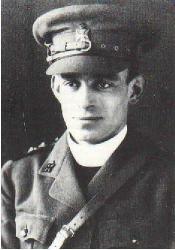
1883 - 1929 Person Name: Geoffrey A. Studdert-Kennedy, 1883-1929 Topics: Gospel Call and Response Author of "Awake, Awake to Love and Work" in Hymns for a Pilgrim People Born with Irish heritage to the vicarage in a deprived parish in Leeds. Studdert Kennedy got into Trinity College Dublin at the age of 14, though poverty meant he did not attend until later, graduating with a First Class degree. He was a popular teacher at Calday Grange Grammar School on the Wirral Peninsula before entering the Anglican Ministry; ordained in Worcester Cathedral in 1908 and married in 1914. He worked in deprived parishes: in Rugby, with his Father in Leeds and St Paul's in Worcester. He was known for his forgetfulness, his generosity (he famously gave away the marital bed to an old lady in need recruiting his wife to help carry the mattress) and his plain speaking.
He became a military chaplain (AKA the Padre) in 1915. He spent time with the men waiting to go to the Front speaking with them and offering to write letters home. He carried a large canvas sack of New Testaments and Woodbine Cigarettes to distribute, often staying on the trains up to the front well after they had left the station earning great popularity and the affectionate nickname Woodbine Willie. In 1917 he was awarded the Military Cross for fetching morphine for a first aid post on the Front while under bombardment and repeatedly going to help the wounded or bury the dead in No Man's Land. During the war his first collection of poetry "Rough Rhymes of a Padre" was published and he achieved widespread national fame. His poems did not shy from the horrors of war or questions of faith raised. He was always on the side of the 'ordinary man'.
After the war he continued in parish ministry before taking an itinerant role with the Industrial Christian Fellowship (still operating) where he proclaimed the gospel and fought for the disadvantaged. He died in Liverpool 1929 intending to keep a commitment despite exhaustion. His memorial in Worcester Cathedral says "A poet: a prophet: a passionate seeker after truth: an ardent advocate of Christian fellowship." His hymns are taken from his collections of verse later anthologised in The Unutterable Beauty (1927).
David L. Gent
Geoffrey Anketel Studdert Kennedy
Herbert Howells
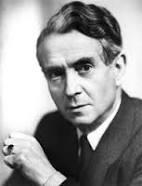
1892 - 1983 Topics: Gospel Call and Response Composer of "MICHAEL" in The New Century Hymnal
Herbert Howells
Richard Runciman Terry

1865 - 1938 Topics: Calling and Response Composer of "HIGHWOOD" in Voices United Terry, Richard R., was born at Morpeth, Jan. 3, 1868, and was Tate Choral Scholar at King's College, Cambridge. In 1896 he became organist and music-master at Downside R. C. College and Abbey, Bath; and in 1901 organist and director of the choir at Westminster Cathedral (R. C.) London. He contributed to A. E. Tozer's Catholic Hymns, 1898, thirteen tunes and the words of two hymns:—
1. Christ, the Lord, is my true Shepherd. Ps. xxiii.
2. Peaceful eve, so still and holy. Christmas Carol. It is marked as D. C. B., i.e. for Downside Coll., Bath.
The tune by Mr. Tozor was published in 1881 to a carol beginning with the same first line, but otherwise entirely different.
--John Julian, Dictionary of Hymnology, New Supplement (1907)
Richard Runciman Terry
John Hughes

1873 - 1932 Topics: Church Anniversaries; The Nature of the Church Called to God's Mission; Church Anniversaries; Confession; Courage; Discipleship and Service; Funerals and Memorial Services; Mission and Outreach; Opening Hymns; Service Music Prayer Responses; Social Concerns Composer of "CWM RHONDDA" in The United Methodist Hymnal John Hughes (b. Dowlais, Glamorganshire, Wales, 1873; d. Llantwit Fardre, Wales, 1932) received little formal education; at age twelve he was already working as a doorboy at a local mining company in Llantwit Fardre. He eventually became an official in the traffic department of the Great Western Railway. Much of his energy was devoted to the Salem Baptist Church in Pontypridd, where he served as both deacon and precentor. Hughes composed two anthems, a number of Sunday school marches, and a few hymn tunes, of which CWM RHONDDA is universally known, the tune was composed in 1905 Baptist Cymanfa Ganu (song festival) in Capel Rhondda, Pontypridd, Wales.
Bert Polman
John Hughes
Mary Jackson Cathey
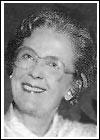
b. 1926 Person Name: Mary Jackson Cathey, 1926- Topics: Gospel Call and Response Author of "God Almighty, God Eternal" in Hymnbook for Christian Worship Mary Jackson Cathey (b. 1926) was born in Florence, SC, and educated at Winthrop University, Rock Hill, SC. She received an advanced degree from Union Seminary - Presbyterian School of Christian Education in Richmond. As a Christian Educator she finds hymn text writing a profound way to express her faith. Her hymns have won contests sponsored by The Hymn Society in the United States and Canada, and a number of her poems have been published by John Knox Press, The Pilgrim Press, and Hope Publishing. She has four hymns to her credit in The Presbyterian Hymnal (1990) and others published by Selah Press, Choristers Guild, and Zimbel Press. She is an elder at the National Presbyterian Church in Washington, DC.
--www.hopepublishing.com
==========================
Mary Jackson Cathey is the Director of Religious Education at the Bethesda Presbyterian Church, Bethesda, Maryland. She formerly served in a similar capacity in the First Presbyterian Church, Anderson, South Carolina. She obtained her M.R.E. degree from the Assembly's Training School, Richmond, Virginia, in 1953; and her A.B. from Winthrop College, Rock Hill, South Carolina, in 1947. She was married recently to Mr. Henry M. Cathey of Bethesda. She is the author of one of the 1956 Youth Hymns entitled "Come forth, O Christian Youth."
--Twelve New World Order Hymns, 1958. Used by permission.
Mary Jackson Cathey
Walter Russell Bowie
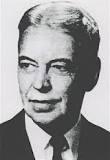
1882 - 1969 Person Name: W. Russell Bowie, 1882- Topics: Gospel Call and Response Author of "Lord Christ, When First Thou Cam'st" in Pilgrim Hymnal Walter Russell Bowie (October 8, 1882–April 23, 1969), was a priest, author, editor, educator, hymn writer, and lecturer in the Episcopal Church (United States).
See also in:
Wikipedia
Walter Russell Bowie
David Evans
1874 - 1948 Person Name: David Evans, 1874-1948 Topics: Gospel Call and Response Harmonizer of "LLANSANNAN" in Pilgrim Hymnal David Evans (b. Resolven, Glamorganshire, Wales, 1874; d. Rosllannerchrugog, Denbighshire, Wales, 1948) was an important leader in Welsh church music. Educated at Arnold College, Swansea, and at University College, Cardiff, he received a doctorate in music from Oxford University. His longest professional post was as professor of music at University College in Cardiff (1903-1939), where he organized a large music department. He was also a well-known and respected judge at Welsh hymn-singing festivals and a composer of many orchestral and choral works, anthems, service music, and hymn tunes.
Bert Polman
David Evans
Ada Blenkhorn
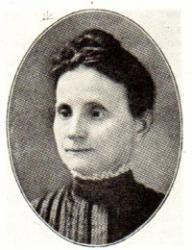
1858 - 1927 Topics: Call and Response Author of "Loyal to Thee" in Elmhurst Hymnal Ada Jane Blenkhorn Canada 1858-1927 Born in Cobourg, Ontario, the 10th of 11 children, she emigrated with her family to the U.S. In 1884 and settled in Cleveland, OH.. She was raised a Methodist, and began writing hymn lyrics at age 34. A prolific writer of hymn lyrics, she was about to give it up when a friend encouraged her to continue, telling her some soul might be saved by a hymn she would write. She worked for many years as secretary to her brother, Henry's, real estate company. After his death in 1923, she became president of the company. She never married.
John Perry
Ada Blenkhorn
Jeremiah Clarke
1669 - 1707 Topics: Call and Response Composer (melody and bass) of "BROCKHAM" in Rejoice in the Lord
Jeremiah Clarke
Francis Albert Rollo Russell
1849 - 1914 Topics: Gospel Call and Response Author of "Christian, Rise and Act Your Creed" in The New Century Hymnal Russell, Francis Albert Rollo, third son of John, first Earl Russell, was born July 10, 1849, and educated at Christ Church, Oxford; B.A. 1873, M.A. 1878. He is a Fellow of the Royal Meteorological Society. His hymns appeared in his Break of Day, London, 1893, from which three passed into Horder's Hymns Supplem., 1894, viz.:—
1. Christian! rise, and act thy creed. Christian Service.
2. Come, Holy Spirit, kind to all. Whitsuntide.
3. O God, Whose voice the angels hear. The Eternal. These are 1893, pp. 127,128,125.
--John Julian, Dictionary of Hymnology, New Supplement (1907)
Francis Albert Rollo Russell
Alfred J. Caldicott
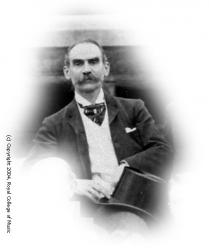
1842 - 1897 Person Name: Alfred J. Caldicott, 1842— Topics: Call and Response Composer of "PASTOR BONUS" in Elmhurst Hymnal The eldest son of a hop merchant and amateur musician at Worcester, the Alfred James Caldicott was born there on November 26, 1842. Like his six brothers, he was a chorister in the Cathedral choir, and at the age of fourteen was articled to the late Mr. Done, the Cathedral organist. He subsequently entered the Conservatorium at Leipzig, where he studied under Moscheles, Hauptmann, and Plaidy. On his return to Worcester he became organist of St. Stephen's Church and to the Corporation, and also conductor of the Worcester Musical Society. In 1878 he took the degree of Bachelor in Music at the University of Cambridge, under the Professorate of Sir G.A.Macfarren. Three years later his sacred cantata "The Widow of Nain" was performed at the Worcester Musical Festival. After a short residence at Torquay in 1882, Mr. Caldicott settled in London in the following year, and was appointed a professor of harmony at the Royal College of Music.
In 1885 he became musical director of the now defunct Albert Palace at Battersea. He toured with an opera company in America, 1890–91 and was conductor at the Comedy and other theatres. Mr Caldicott is, however, best known as a composer of vocal music cast in a light vein, in which he was highly successful. For the German Reed entertainments he composed "Treasure Trove" (1883) and other operettas, thirteen in all. "John Smith" and "The Girton Girl and the Milkmaid", composed for London theatres, were of a similar nature. Two cantatas for female voices – "A Rhine Legend" and "Queen of May" – must also be mentioned. Mr. Caldicott's humorous part-songs, of which "Humpty Dumpty" (special prize, Manchester Gentlemen's Glee Society, 1878) is a highly characteristic specimen, gave the lamented composer widespread popularity.
--www.cph.rcm.ac.uk/
Alfred J. Caldicott
Healey Willan
1880 - 1968 Topics: Calling and Response Composer of "ST BASIL" in Voices United Healey Willan (b. Balham, London, England, October 12, 1880; d. Toronto, Ontario, February 16, 1968), theory teacher, composer and organist, was born into an Anglo-Catholic family in England and served several churches in the London area, becoming known especially for his adaptations of Gregorian chant to be able to be sung in English translation. In 1913 he moved to Canada where he led the theory department and was organist at the Toronto Conservatory of Music. He also was organist at St. Paul’s, Canada’s largest Anglican church, and after 1921 at the smaller Church of St. Mary Magdalene. By invitation, he composed an anthem for the coronation of Queen Elizabeth II, a singular honor for one not residing in England.
Emily Brink
Healey Willan
Joseph R. Alfred
b. 1947 Topics: Calling and Response Author, vv. 2-4 of "Faith of Our Fathers" in Voices United
Joseph R. Alfred
Cyril Alington

1872 - 1955 Person Name: C. A. Alington Topics: Call and Response Author of "You That Know the Lord Is Gracious" in Rejoice in the Lord Educated at Trinity College, Oxford, England, Cyril A. Alington (b. Ipswich, England, 1872; d. St. Leonards, Hertfordshire, England, 1955) was ordained a priest in the Church of England in 1901. He had a teaching career that included being headmaster at Shrewsbury School and Eton College. He was dean of Durham from 1933-1951 as well as chaplain to the king of England. His writings include literary works and Christianity in England, Good News (1945). Many of his hymns appeared in various twentieth-century editions of the famous British hymnal, Hymns Ancient and Modern.
Bert Polman
Cyril Alington
T. Tertius Noble

1867 - 1953 Person Name: Thomas Tertius Noble Topics: Gospel Call and Response Composer of "ORA LABORA" in The New Century Hymnal Thomas Tertius Nobel (1867-1953) was born in Bath, England, educated at the Royal College of Music, and was a noted composer and organist. He served as a church organist in Cambridge and Colchester. He moved to Ely Cathedral in 1892 as organist and choirmaster, and in 1898 to York Minster, where he founded the York Symphony Orchestra, directed the York Musical Society, conducted the York Pageant, and revived the York Musical Festival after a lapse of 75 years. He became an honorary fellow of the Royal College of Organists in 1905. In 1913, he moved to New York City, where he was organist at St. Thomas’ Episcopal Church, and established its choir school and a boys’ choir. In addition to composing, he wrote about music education, and helped edit the 1916 Protestant Episcopal hymnal, and served on the music committee that prepared its 1940 successor. He wrote a wide range of music, but only his services, anthems and hymn tunes are still performed regularly. Died: May 4, 1953, Rockport, Massachusetts.
http://www.hymntime.com/tch/
T. Tertius Noble


 My Starred Hymns
My Starred Hymns


